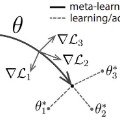The main goal of Few-Shot learning algorithms is to enable learning from small amounts of data. One of the most popular and elegant Few-Shot learning approaches is Model-Agnostic Meta-Learning (MAML). The main idea behind this method is to learn shared universal weights of a meta-model, which then are adapted for specific tasks. However, due to limited data size, the method suffers from over-fitting and poorly quantifies uncertainty. Bayesian approaches could, in principle, alleviate these shortcomings by learning weight distributions in place of point-wise weights. Unfortunately, previous Bayesian modifications of MAML are limited in a way similar to the classic MAML, e.g., task-specific adaptations must share the same structure and can not diverge much from the universal meta-model. Additionally, task-specific distributions are considered as posteriors to the universal distributions working as priors, and optimizing them jointly with gradients is hard and poses a risk of getting stuck in local optima. In this paper, we propose BayesianHyperShot, a novel generalization of Bayesian MAML, which employs Bayesian principles along with Hypernetworks for MAML. We achieve better convergence than the previous methods by classically learning universal weights. Furthermore, Bayesian treatment of the specific tasks enables uncertainty quantification, and high flexibility of task adaptations is achieved using Hypernetworks instead of gradient-based updates. Consequently, the proposed approach not only improves over the previous methods, both classic and Bayesian MAML in several standard Few-Shot learning benchmarks but also benefits from the properties of the Bayesian framework.
翻译:少见的学习算法的主要目标是从少量数据中学习。最受欢迎和最优雅的少少见的学习方法之一是典型的麦当劳模式(MAML),这一方法背后的主要思想是学习一个元模型的共同普遍加权,然后根据具体任务加以调整。然而,由于数据规模有限,该方法存在过大和低度的不确定性。贝叶办法原则上可以通过学习比点偏重的海平价分配法来减轻这些缺陷。不幸的是,以前对麦当劳的Bayesian-Hyper-Shot的修改与经典的麦当劳模式(MAML)相似,例如,任务特定的调整必须具有相同的结构,不能与通用的元模型有很大差异。此外,任务特定的分布被视为通用分配的外延,与梯度相结合的优化是困难的,并有可能被困在本地的奥地平比值值值值值上。 不幸的是,我们建议拜伊西亚-HyperS的更新, 一种创新的典型的基调化方法不能比以往的马当量级标准。



